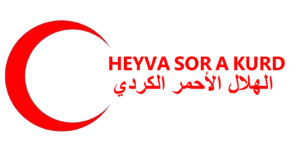Distributing health kits and baby milk for IDPs
Within the emergency plan announced by the Kurdish Red Crescent Organization to support the displaced people from the countryside of Aleppo, Afrin, and Shahba, and with the support of the “waldensian church” organization, hygiene kits and formula milk for children aged from one month to one year were provided to the displaced within the shelters in Raqqa, Tabqa, Hasakah, and Qamishlo.






















